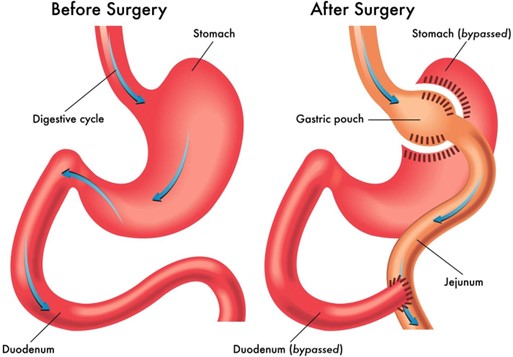An adult woman who had gastric bypass surgery two weeks ago is admitted because she is exhibiting signs of anastomosis leakage. Her vital signs are: temperature 100°F (37.8°C), blood pressure 98/50 mm Hg, heart rate 135 beats/minute, and respiratory rate 24 breaths/minute. Which intervention is most important for the nurse to include in this client's plan of care?
Replace fluids intravenously based on intake and output.
Record the amount of daily wound drainage.
Assess skin condition and turgor for breakdown.
Turn every 2 hours around the clock from side-to-side.
The Correct Answer is A
Choice A Reason: This is the correct answer because the client's vital signs indicate that she is hypovolemic and dehydrated due to the leakage of gastric contents from the anastomosis site. The nurse should replace fluids intravenously to prevent shock and electrolyte imbalance.
Choice B Reason: Recording the amount of daily wound drainage is important but not the most important intervention for this client because it does not address the immediate problem of fluid loss and hypovolemia. The nurse should monitor the wound drainage for signs of infection and report any changes to the physician.
Choice C Reason: Assessing skin condition and turgor for breakdown is important but not the most important intervention for this client because it does not address the immediate problem of fluid loss and hypovolemia. The nurse should assess the skin for signs of dehydration and pressure ulcers and provide appropriate skin care.
Choice D Reason: Turning every 2 hours around the clock from side-to-side is important but not the most important intervention for this client because it does not address the immediate problem of fluid loss and hypovolemia. The nurse should turn the client to prevent complications such as pneumonia and atelectasis but also consider the client's comfort and pain level.

Nursing Test Bank
Naxlex Comprehensive Predictor Exams
Related Questions
Correct Answer is A
Explanation
Choice A Reason: This role is responsible for coordinating the continuum of care for clients with complex health needs, such as head injury. The nurse case manager collaborates with the interdisciplinary team, the client, and the family to plan, implement, and evaluate the client's care from admission to discharge.
Choice B Reason: This role is responsible for providing primary and specialty care to adults, such as diagnosing and treating acute and chronic conditions, prescribing medications, and ordering tests. The adult nurse practitioner may be involved in the client's care, but not in coordinating it.
Choice C Reason: This role is responsible for managing the daily operations of the neurology unit, such as staffing, budgeting, quality improvement, and staff development. The neurology unit supervisor may oversee the client's care while on the unit, but not throughout the continuum of care.
Choice D Reason: This role is responsible for identifying and preventing potential risks and liabilities in the healthcare setting, such as errors, injuries, infections, or lawsuits. The risk management nurse may monitor the client's care for quality and safety issues, but not for coordination.
Correct Answer is C
Explanation
Choice A Reason: Instructing UAPs to transfer all non-ambulatory clients via wheelchairs is not a good intervention, as it may expose the clients and the UAPs to smoke and fire, and cause panic and congestion in the hallways. The charge nurse should follow the RACE protocol (Rescue, Alarm, Contain, Extinguish), which means rescuing only those clients who are in immediate danger, and containing the fire by closing doors and windows.
Choice B Reason: Instructing the nursing staff to evacuate ambulatory clients to the nearest fire exits is not a good intervention, as it may also expose the clients and the staff to smoke and fire, and interfere with the fire
department's efforts. The charge nurse should follow the RACE protocol, which means evacuating only as a last resort, and only after receiving instructions from the fire department.
Choice C Reason: Shutting all doors to client rooms and telling everyone to stay in their rooms until the fire
department arrives is the best intervention, as it follows the RACE protocol, which means containing the fire by closing doors and windows, and extinguishing it if possible with a fire extinguisher. This intervention also helps protect the clients and staff from smoke inhalation and fire spread, and allows the fire department to access and control the fire.
Choice D Reason: Announcing in a calm voice that all visitors should proceed immediately to the first floor via the service elevators is not a good intervention, as it may endanger the visitors and cause more damage. The charge nurse should follow the RACE protocol, which means alarming others by activating the fire alarm system and calling 911. The charge nurse should also instruct visitors not to use elevators during a fire, as they may malfunction or trap them inside.
Whether you are a student looking to ace your exams or a practicing nurse seeking to enhance your expertise , our nursing education contents will empower you with the confidence and competence to make a difference in the lives of patients and become a respected leader in the healthcare field.
Visit Naxlex, invest in your future and unlock endless possibilities with our unparalleled nursing education contents today
Report Wrong Answer on the Current Question
Do you disagree with the answer? If yes, what is your expected answer? Explain.
Kindly be descriptive with the issue you are facing.
